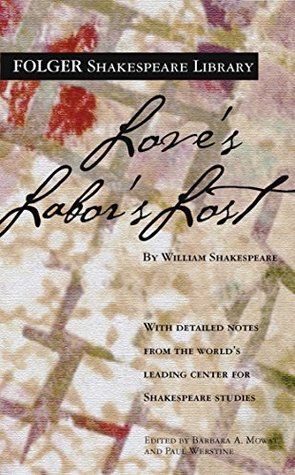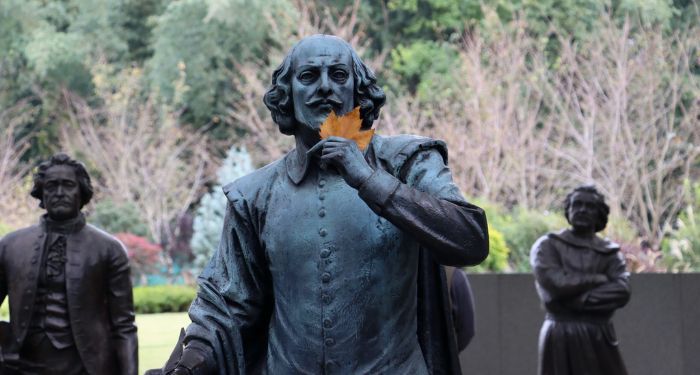In the Doctor Who episode “The Shakespeare Code,” Shakespeare’s combinations of words prove magical enough to release a witchy species of aliens who attempt to take over the earth and revert it to fire and blood. His “new and glittering words” then serve to imprison them. Thankfully we live in a world with both Shakespeare and humans. If Shakespeare’s words are powerful enough to call up exiled aliens, they must have been unnaturally special. However, tackling the question of “how many words did Shakespeare invent?” is no easy feat.

Shakespeare wrote at least 38 plays and 154 sonnets, and the official count is 884,647 words and 118,406 lines. Shakespeare’s longest play is Hamlet, which includes the first use of the word “rant.” His shortest play is The Comedy of Errors, a madcap confusion-driven play, which includes the first use of the word “gossip.” The Oxford English Dictionary has estimated that Shakespeare invented around 1,700 words.
The majority of Shakespeare’s plays were not published during his lifetime — the first major collection of his work was the First Folio, published in 1623. Without this folio edition, we wouldn’t have the majority of Shakespeare’s plays in circulation today. After the publication of the First Folio, three subsequent Folios were published in 1632, 1664, and 1685. In contemporary times, we have countless editions of Shakespeare plays, with some being geared towards performers and others more tailored to the classroom.
How to Invent a Word
When we say that Shakespeare invented a word, it tends to mean that his work was the first written documentation of a word. The original volumes of the Oxford English Dictionary (OED) were published between 1884 and 1928, and they included tons of Shakespeare quotes. Since Shakespeare’s work was so dominant in the OED, over 1,700 words were believed to be the first time that the word was used in the English language. However, this is a disputed figure.
The first documented use of a word is what’s important to lexicography, the process of compiling a dictionary. In Elizabethan England, only 30% of men and 10% of women were thought to be able to read and write. Words commonly in use in conversation could not always make it into the written record. So when we say that Shakespeare invented words, it’s not that he was throwing new gibberish at his audience that they had never heard before. There were many words he used that were common in speech, but it took Shakespeare’s plays to preserve them.
Shakespeare scholar David McInnis explains the OED’s attribution as a kind of bias towards their preferred literary masters: “The Complete Works of Shakespeare was frequently raided for early examples of word use, even though words or phrases might have been used earlier, by less famous or less literary people.” The OED was assembled by a group of people drawing on the knowledge they had together, so it didn’t have the best peer review process.
In its current state, the OED is committed to reviewing every documented word and confirming the historical accuracy of their lineage. They are in the process of updating entries for many words that were previously attributed as first used by Shakespeare, finding texts that predate when Shakespeare’s plays were published or performed.

There is still debate about which words can be unequivocally attributed to Shakespeare as the first documented use. The Shakespeare Birthplace Trust has a short list of words they believe to be definitively invented by The Bard, and the citations from their popular plays. For example, “kissing” originated in Love’s Labour’s Lost. However, a recent count from LitCharts lists 420 words that we can be certain Shakespeare originated in written language.
But How Many Words Did Shakespeare Invent?
You can find a list of 420 words academics are certain Shakespeare invented here. Some of the highlights are accessible, arch-villain, bloodsucking, characterless, coldhearted, dauntless, equivocal, fashionable, generous, howl, informal, leapfrog, misquote, never-ending, obscene, pageantry, quarrelsome, reinforcement, savagery, tardiness, useful, varied, watchdog, well-read, and zany.
Shakespeare’s invented words include both wholesale new words and many compound words. He also is credited with novel uses of words — he used verbs as nouns and nouns as verbs in new ways. In addition to the words, there are also many phrases Shakespeare invented: “heart of gold,” “the beast with two backs,” and “the green-eyed monster.”
Many words invented by Shakespeare are verbs: to dishearten, to enthrone, to gossip, and more. There are also around 30 words on the list that include the prefix un: uneducated, unhelpful, unsolicited, unsullied, and many more.
Novel use of words could have been a way for the OED lexicographers to assert that Shakespeare was as important to history as he was to them personally. The resonance of his plays reaches far beyond their original period, and whatever the real count of words is, he certainly expressed himself in new and exciting ways.
The Legacy of Shakespeare’s Words
There are many reasons we still use Shakespeare’s invented words. It’s not just that we reread Shakespeare because his work is assigned in schools and there are countless adaptations. His words affected language and speech patterns.
As a Shakespeare lover, it’s easy to for me to accept that Shakespeare’s words could call across time and space and resurrect a nearly-extinct alien witch species. If you’re a Shakespeare nerd, you can read many great modern adaptations, dive into romantic retellings and Sapphic adaptations, and cross-stitch the day away with the Bard.
